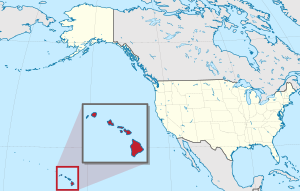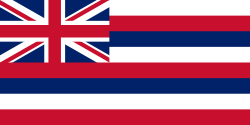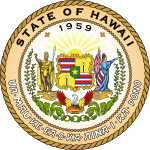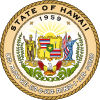Hawaii
Hawaii (sometimes spelled Hawai'i) is a U.S. state and the only U.S. State that is in Oceania. It is the last state that joined the United States, becoming a state on August 21, 1959. It is the only state made only of islands. Hawaii is also the name of the largest island. The capital and largest city of Hawaii is Honolulu on the island named Oahu.
Hawaii
Hawaiʻi (Hawaiian) | |
|---|---|
| State of Hawaii Mokuʻāina o Hawaiʻi (Hawaiian) | |
| Nickname(s): | |
| Motto(s): | |
| Anthem: Hawaiʻi Ponoʻī (Hawaiʻi's Own True Sons)[4] | |
 Map of the United States with Hawaii highlighted | |
| Country | United States |
| Before statehood | Territory of Hawaii |
| Admitted to the Union | August 21, 1959 (50th) |
| Capital (and largest city) | Honolulu |
| Largest metro and urban areas | Honolulu |
| Government | |
| • Governor | Josh Green (D) |
| • Lieutenant Governor | Sylvia Luke (D) |
| Legislature | State Legislature |
| • Upper house | Senate |
| • Lower house | House of Representatives |
| Judiciary | Supreme Court of Hawaii |
| U.S. senators |
|
| U.S. House delegation | 1: Ed Case (D) 2: Jill Tokuda (D) (list) |
| Area | |
| • Total | 10,931 sq mi (28,311 km2) |
| • Land | 6,423 sq mi (16,638 km2) |
| • Water | 4,507 sq mi (11,672 km2) 41.2% |
| • Rank | 43rd |
| Dimensions | |
| • Length | 1,522 mi (2,450 km) |
| • Width | n/a mi (n/a km) |
| Elevation | 3,030 ft (920 m) |
| Highest elevation | 13,796 ft (4,205.0 m) |
| Lowest elevation (Pacific Ocean[6]) | 0 ft (0 m) |
| Population (2020) | |
| • Total | 1,455,271 |
| • Rank | 40th |
| • Density | 221/sq mi (82.6/km2) |
| • Rank | 13th |
| • Median household income | $83,200[7] |
| • Income rank | 6th |
| Demonym(s) | Hawaii resident,[8] Hawaiian[c] |
| Language | |
| • Official languages | |
| Time zone | UTC−10:00 (Hawaii) |
| USPS abbreviation | HI |
| ISO 3166 code | US-HI |
| Traditional abbreviation | H.I. |
| Latitude | 18° 55′ N to 28° 27′ N |
| Longitude | 154° 48′ W to 178° 22′ W |
| Website | hawaii |
| Hawaii state symbols | |
|---|---|
 | |
 | |
| Living insignia | |
| Bird | Nene |
| Fish | Humuhumunukunukuāpuaʻa |
| Flower | Pua aloalo |
| Insect | Pulelehua |
| Tree | Kukui tree |
| Inanimate insignia | |
| Dance | Hula |
| Food | Kalo (taro) |
| Gemstone | ʻĒkaha kū moana (black coral) |
| Other | Heʻe nalu (surfing) (state individual sport) |
| State route marker | |
 | |
| State quarter | |
 Released in 2008 | |
| Lists of United States state symbols | |
Name
changeHawaii is known as the "Aloha State". Aloha is a Hawaiian word that has many meanings like welcome, hello and goodbye. Aloha also means love and care. The different meanings are brought together in the term "Aloha Spirit" to describe the friendly people of Hawaii.
Geography
changeHawaii is an archipelago, a long chain of islands. There are eight main islands and many small islands and atolls. They are the tops of underwater volcanos. The main islands are Niihau, Kauai, Oahu, Molokai, Lanai, Kahoolawe, Maui and Hawaii.
History
changeThe first people of Hawaii were Polynesians. They came to the islands sometime between 200 and 600 AD. Captain James Cook discovered the islands in 1778. Others may have been there before him. Captain Cook named the islands the Sandwich Islands for the fourth Earl of Sandwich, John Montague.
Kamehameha I was the first king of Hawaii. He united the separate small Hawaiian kingdoms into one large kingdom in 1795. In 1893, American soldiers stopped Queen Liliuokalani from leading Hawaii when American business people took over the government and made their own laws. She was the last monarch of Hawaii. She also wrote the original words of the song called Aloha Oe.
The Americans made Hawaii into a republic for a short time. The new leader, Sanford Dole was called the President of Hawaii. In 1898, the United States of America took over the government and made Hawaii into a territory.In 1907, University of Hawaiʻi is established. In 1959, Hawaii became the fiftieth American state. In other words, it was taken ("annexed") against the wishes of its native people. Their queen, Lili’uokalani, wrote that “it had not entered into our hearts to believe that these friends and allies from the United States… would ever go so far as to absolutely overthrow our form of government, seize our nation by the throat, and pass it over to an alien power”.[9]
Reason for statehood
changeEarly in World War II the U.S. Pacific Fleet was based on the Philippines. Perceiving that this was not safe, the navy moved its base to the Hawaiian islands, namely Oahu (the main island in the chain). It was there that the Japanese attacked Pearl Harbor. That was significant in the later discussions about the future of the islands.
Economy
changeThe biggest industry of Hawaii is tourism. Almost seven million people visited in 2000. Important exports are sugar, pineapple, macadamia nuts, and coffee.
Popular tourist sites include Waikiki Beach, Hawaii Volcanoes National Park, Polynesian Cultural Center, and the USS Arizona Memorial at Pearl Harbor.
State symbols
changeThe state flower is the yellow hibiscus (Hibiscus brackenridgei or ma'o hau hele). The state bird is the Hawaiian goose (nene). The state fish is the reef triggerfish, also called the humu humu nuku nuku apua'a. The state tree is the candlenut, also called kukui. The state song is Hawaii Ponoi. The state motto is Ua mau ke ea o ka aina i ka pono. In English it says, The life of the land is perpetuated in righteousness.
References
change- ↑ Brodie, Carolyn S; Goodrich, Debra; Montgomery, Paula Kay (1996). The Bookmark Book. Englewood, CO: Libraries Unlimited. ISBN 9781563083006. OCLC 34164045. Retrieved August 5, 2015.
- ↑ "Play Ball holds unforgettable 1st event in Hawaii". MLB.com. Archived from the original on November 19, 2019. Retrieved April 6, 2020.
- ↑ Hawaii State Legislature. "Haw. Rev. Stat. § 5–9 (State motto)". Archived from the original on October 15, 2015. Retrieved December 9, 2013.
- ↑ Hawaii State Legislature. "Haw. Rev. Stat. § 5–10 (State song)". Archived from the original on January 16, 2003. Retrieved December 9, 2013.
- ↑ "Summit USGS 1977". NGS data sheet. U.S. National Geodetic Survey.
- ↑ 6.0 6.1 "Elevations and Distances in the United States". United States Geological Survey. 2001. Archived from the original on October 15, 2011. Retrieved October 21, 2011.
- ↑ "US Census Bureau QuickFacts: Hawaii". US Census Bureau. Retrieved May 9, 2022.
- ↑ "Style Manual; An official guide to the form and style of Federal Government publishing" (PDF). United States Government Publishing Office. 2016. Archived (PDF) from the original on July 29, 2018. Retrieved April 27, 2020.
- ↑ Liliuokalani, Queen of Hawaii (February 23, 2021). Hawaii's story by Hawaii's Queen. ISBN 978-1-5132-0902-9. OCLC 1262093837.
Notes
- ↑ Elevation adjusted to North American Vertical Datum of 1988.
- ↑ The summit of Mauna Kea is the highest point in Oceania. Mauna Kea is also the tallest mountain on Earth when measured from base to summit. The shield volcano sits on the floor of the Pacific Ocean at a depth of 5,998 meters (19,678 ft) for a total height of 10,205.3 meters (33,482 ft)
- ↑ Local usage generally reserves Hawaiian as an ethnonym referring to Native Hawaiians. Hawaii resident or from Hawaii is the preferred local form to refer to state residents in general regardless of ethnicity. Hawaii may also be used adjectivally. The AP Stylebook, 42nd ed. (2007), also prescribes this usage (p. 112).
Other websites
changeMedia related to Hawaii at Wikimedia Commons

